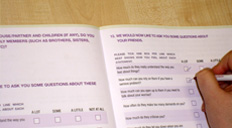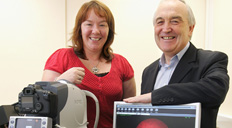Data Collection
TILDA fieldwork involves interviews using computer-aided personal interviewing (CAPI) techniques and a Self-Completion Questionnaire (SCQ). At health waves (Waves 1, 3 and 6) participants are also invited to complete a health assessment, either at a TILDA Health Assessment Centre, where appropriate medical measurement facilities are available, or in the respondents' home, where a qualified research nurse will visit and take physical measurements and bio-medical samples.
Computer-Assisted Personal Interview (CAPI)

At each wave of TILDA, participants first complete a computer-assisted personal interview (CAPI) in their own homes. Detailed information on all aspects of the respondents’ lives is collected in the CAPI, including the economic dimension (pensions, employment, living standards), health aspects (physical, mental, service needs and usage) and the social domain (contact with friends and kin, formal and informal care, social participation).
Self-Completion Questionnaire (SCQ)

Each participant is also asked to complete and return a questionnaire designed to explore certain areas that were considered particularly sensitive for respondents to answer directly to an interviewer (e.g. relationship quality, sexuality, loneliness, stressful life events, worry and alcohol intake). At each wave to date, approximately 85% of participants who complete a CAPI also return an SCQ.
Health Assessment

Wave 1 and 3 of TILDA included a comprehensive health assessment, with a health assessment also planned for Wave 6 (2020-2021). After completing the CAPI part of the survey at Wave 1, each participant was then invited to travel to one of two health centres (based in Dublin and Cork) for a comprehensive health assessment. At Wave 3, the health centre was based in Dublin only. Participants who were unable / unwilling to attend a health centre were offered a modified and partial assessment in their own home. Health assessments were carried out by qualified and trained research nurses. Cognitive, cardiovascular, gait and balance and vision measurements and tests were taken in the health assessment. Of the 8,175 participants aged 50+ at Wave 1, 5,897 underwent a health assessment (85% in the health assessment in Dublin or Cork and 15% in their own home). At Wave 3, 5,391 participants underwent a health assessment (80% in the Dublin health assessment centre and 20% in their own home).

